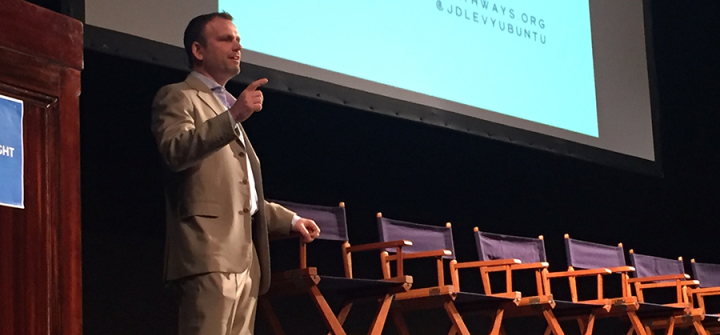Focus on Lives Transformed, Trust Those Closest to the Problem, and Restricted Funding Is “Bad Tequila"
The smiling people on the project websites never tell the whole story—global health and development takes hard work, realistic goals, admitting to failure, and sticking around long enough to fix the problems, Jordan Levy told Unite for Sight attendees Saturday.
Framing the 15th Global Health & Innovation Conference’s focus on responsible work and cultural humility, Levy, the Chief External Relations Officer of Ubuntu Pathways, shared some tough truths based on his years of experience in South Africa. He urged global health innovators and change seekers to recognize that the status quo is not going to provide the solutions. One key, he said: “Trust those closest to the problem to develop the solution: Hire locally, live locally, engage locally.”
That’s the idea behind the conference’s Innovation Award, he added. The judges ask if the need for the innovation can be locally identified; it must be locally needed, locally accepted, and locally effective—even though that is often different than what’ is most popular in the boardroom, easiest to sell, and most marketable.
Levy’s organization faced many obstacles building an effective institution to lift children out of poverty, taking them from cradle to career. Ubuntu Pathways ultimately survived, and thrived even, but he acknowledged that the bonds were tested along the way, teaching him to put humanity at the center. “Impact through depth, focus on lives transformed, not lives touched—that means a sustained interaction, a real relationship,” he said. “Focus on lives transformed, not lives touched," he urged—which means a real, sustained relationship.”
He also touched on money matters, and the challenges of fundraising for long-term organizational stability—warning that “all money is not good money.”
Unfortunately, funding streams are often at odds with building long-term, in-depth relationships needed for this kind of success, he said. Once-off, quick fix donations are not the path to organizational stability, and highly restricted funding, he said, leads to needless bureaucracy and mission drift.
He then delighted the audience with his characterization of funding streams: “Unrestricted funding is like your favorite drink … let’s say a craft beer, goes down easy, you feel great. Restricted funding is bad tequila. It goes down rough, and then the next thing you know, you’re in a place you don’t recognize, and you’ve lost some of your integrity.”
In a Q&A session after his talk, Anne Dressel University of Wisconsin Milwaukee asked Levy about the tension between local and expectations of the outside world and donors on scaling up—a constant pressure which he said is often the bane of a nonprofit’s existence. “If I start showing pictures on my website of the things that we failed at, instead of the beautiful wonderful kids who succeeded, I’m not going to get any money and somebody else is—because they’re saying that they reached 5 billion people this week which is BS,” he said. The question is, when will people start respecting depth?
Join the tens of thousands of subscribers who rely on Global Health NOW summaries and exclusive articles for the latest public health news. Sign up for our free weekday enewsletter, and please share the link with friends and colleagues: http://www.globalhealthnow.org/subscribe.html
Jordan Levy, Chief External Relations Officer, Ubuntu Pathways





